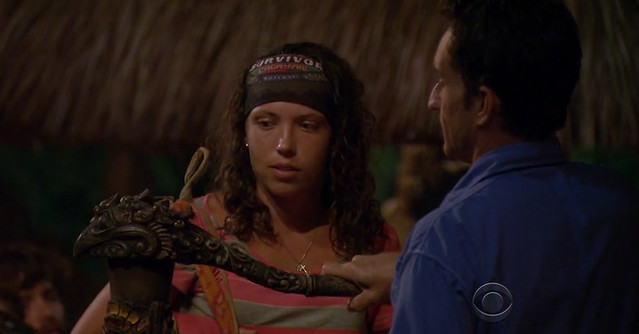Some say reality television competitions are the trashiest trash on television. Some also say one man’s trash is another man’s treasure. So I say (at least some) reality television competitions are the treasure-iest treasure on television.
This is why it is no surprise that my favourite television program of all time is Survivor. But I’m amazed to have come across several people in my classes who have barely any knowledge of the show. I’ll try to break it down.
The premise is simple. 16-20 Americans (season dependent) are divided into 2-4 (season dependent) evenly-numbered teams and dropped into an exotic location for 39 days with – as the show’s host Jeff Probst loves to remark – “nothing but a machete, a pot for water, a bag of rice, and the clothes on their back“. Each episode usually follows the same three day structure – on the first day, the contestants will compete in a challenge for a reward such as some sort of item to make their lives easier (for example; a flint-stick for fire, fishing gear, a tarp, etc).
On the third day of the cycle, the contestants will compete in another challenge – this time for immunity. Those who aren’t immune are vulnerable at that episodes “Tribal Council” – where the tribe vote one of their members out of the game. This is accompanied by the ceremonious torch-snuffing by Probst (as fire is representative of the contestant’s “life” in the game at Tribal Council) and the famous exclamation that “the tribe has spoken“.
At the end of the season, the final 2-3 remaining castaways plead their case to win to a jury of the 7-9 most recently eliminated contestants. The jury then vote for one of the remaining contestants to win the grand prize of $1 million.
However, the show’s complexities run deeper than that, with the emergent of social interaction and the formation of tribal council voting blocs or ‘alliances’ becoming the forefront focus of the show; rather than the survival element.
This is why the editing of the show is so incredible. A crew of approximately 15 people are tasked with cutting down 72 hours of complex social and strategical interaction into one hour of cohesive television. Over the course of the season, the editors are also tasked with forging storylines. Turning regular, every day people into people we love or love-to-hate.
They do this via several editing techniques. Clipping and splicing together “confessionals” to have contestants narrate the show or voice their thoughts allows one method. If a hard-working widowed mother-of-six is betrayed by a member of her alliance, you can be sure that the traitor will be made to sound as though they have no remorse when they explain their actions; even if this means the editors remove large sections of the player’s confessional where they rationalize why they did what they did.
Similarly, a heroic player overcoming the odds in a challenge is likely to have their victory backed by a triumphant, soaring non-diegetic soundtrack; to influence the viewer to feel good about the event; even if the edit is only showing the good in the player, and had omitted the player spending the whole morning before the challenge being arrogant, mean or selfish.
Reality television is also well-known for its use of the “reaction shot”; but sometimes this is spliced in from another point in time, and is not actually a contestant’s reaction to what is unfolding. Reaction shots allow a viewer to understand the tension or emotion of what is unfolding in that moment. Most reality television shows are shot months in advance, so editors have lots of time to trawl their many cameras in order to find these and splice them in.
At the end of the day, reality TV is just another form of entertainment, and like any other television show there are interesting characters, boring characters, lovable heroes, despicable villains, characters we hate-to-love and characters we love-to-hate. But what makes editing in reality television so interesting to me is that there is no scriptwriters creating a story for the contestants to follow. Instead, it is the contestants creating a bare-bones of the story for the editors to follow (editing cannot entirely manipulate the events of what transpired, such as who was eliminated when), and it is the editors who ‘flesh out’ this story for the viewers enjoyment. This is why it is so interesting to me to study the storytelling of reality television.

Leave a Reply
You must be logged in to post a comment.